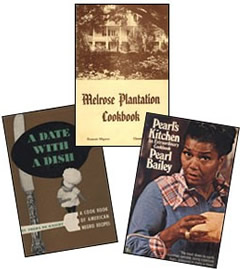 Tuscaloosa, Ala. – The University of Alabama Libraries recently received one of the largest collections of African-American cookbooks in the country – some 450 volumes covering the period from 1827, when the first book with recipes by an African-American was published, through the year 2000.
Tuscaloosa, Ala. – The University of Alabama Libraries recently received one of the largest collections of African-American cookbooks in the country – some 450 volumes covering the period from 1827, when the first book with recipes by an African-American was published, through the year 2000.
Known as the David Walker Lupton African-American Cookbook Collection and housed in the Hoole Special Collections Library, the collection offers a wealth of information about the relationship between food and African-American history and culture from the recipes of countless talented African-American chefs who provided elegant cuisine in fine restaurants, hotels and club cars to the advent of the soul food movement in the late 1960’s.
Dr. Louis Pitschmann, dean of libraries who helped bring the collection to UA, is overseeing a public viewing of samples from the collection through the end of February at the Gorgas Library.
When David W. Lupton, a distant cousin of former UA President Nathaniel Thomas Lupton, was considering a permanent home for his collection, UA seemed to offer the ideal context both geographically and institutionally. His widow, Dorothy R. Lupton, finalized the arrangements for transferring the volumes last summer.
“The Lupton Collection is a significant addition to the libraries’ resources for many reasons. First of all, the collection is a treasure trove of rare and obscure books, many of them not widely published, that too often pass ‘under the radar’ of what libraries acquire,” said Dr. Clark Center, curator of the Hoole Special Collections Library.
Dr. Amilcar Shabazz, director of the African-American studies program said, “This collection will make possible the kind of creative research in food and ethnic identity that has lately become the focus of numerous university press publications.”
Culinary texts are written from the point of view of an individual or a community and, as such, have much to say about ethnic identity, family and community life, social history, the roles of women and men, values, religion, and economics, as well as the more obvious fields of diet and nutrition, use of agricultural products, the food supply, and general food history.
Almost every title in the cookbook collection suggests more than recipes: food is linked with music, humor, social satire (see the underground classic, Vibration Cooking) cultural and religious celebrations (several Kwanzaa cookbooks, for example) and almost every aspect of life.
Examples from the collections include cook books and recipes by:
- Celebrities including Muhammad Ali, Pearl Bailey, Mahalia Jackson, Patti LaBelle, and Oprah Winfrey among others
- George Washington Carver, famed educator and director of agriculture at Alabama’s historic Tuskegee Institute and today’s Tuskegee University
- Authors from New York to California and states in between; the Caribbean, and Germany
- Church groups, sororities, health organizations, food industry
Please visit http://dialog.ua.edu/dialog20050124/cookbooks20050124.html, where more detailed information about the collection can be found.
Contact
Rebecca M. Booker, UA Media Relations, 205/348-3782, rbooker@ur.ua.edu
Source
Kate Ragsdale, Planning Officer, University Libraries, 205/348-1484